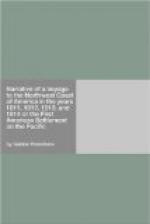The ship, which had been detained by circumstances, much longer than had been anticipated, left her anchorage at last, on the 1st of June, and dropped down to Baker’s bay, there to wait for a favorable wind to get out of the river. As she was to coast along the north, and enter all the harbors, in order to procure as many furs as possible, and to touch at the Columbia river before she finally left these seas for the United States, it was unanimously resolved among the partners, that Mr. M’Kay should join the cruise, as well to aid the captain, as to obtain correct information in regard to the commerce with the natives on that coast. Mr. M’Kay selected Messrs. J. Lewis and O. de Montigny to accompany him; but the latter having represented that the sea made him sick, was excused; and Mr. M’Kay shipped in his place a young man named Louis Brusle, to serve him in the capacity of domestic, being one of the young Canadian sailors. I had the good fortune not to be chosen for this disastrous voyage, thanks to my having made myself useful at the establishment. Mr. Mumford (the second mate) owed the same happiness to the incompatibility of his disposition with that of the captain; he had permission to remain, and engaged with the company in place of Mr. Aikin as coaster, and in command of the schooner.[I]
[Footnote I: This schooner was found too small for the purpose. Mr. Astor had no idea of the dangers to be met at the mouth of the Colombia, or he would have ordered the frame of a vessel of at least one hundred tons. The frames shipped in New York were used in the construction of this one only, which was employed solely in the river trade.]
On the 5th of June, the ship got out to sea, with a good wind. We continued in the meantime to labor without intermission at the completion of the storehouse, and in the erection of a dwelling for ourselves, and a powder magazine. These buildings were constructed of hewn logs, and, in the absence of boards, tightly covered and roofed with cedar bark. The natives, of both sexes, visited us more frequently, and formed a pretty considerable camp near the establishment.
On the 15th, some natives from up the river, brought us two strange Indians, a man and a woman. They were not attired like the savages on the river Columbia, but wore long robes of dressed deer-skin, with leggings and moccasins in the fashion of the tribes to the east of the Rocky Mountains. We put questions to them in various Indian dialects; but they did not understand us. They showed us a letter addressed to “Mr. John Stuart, Fort Estekatadene, New Caledonia.” Mr. Pillet then addressing them in the Knisteneaux language, they answered, although they appeared not to understand it perfectly. Notwithstanding, we learned from them that they had been sent by a Mr. Finnan M’Donald, a clerk in the service of the Northwest Company, and who had a post on a river which they called Spokan; that having lost their way, they had followed the course of the Tacousah-Tesseh (the Indian name of the Columbia), that when they arrived at the Falls, the natives made them understand that there were white men at the mouth of the river; and not doubting that the person to whom the letter was addressed would be found there, they had come to deliver it.




